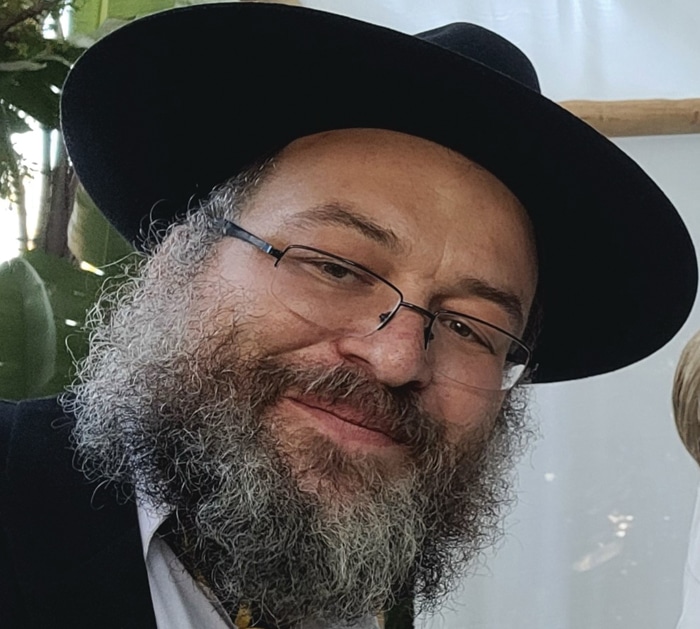 Rabbi Dovid Gurevich
Rabbi Dovid Gurevich Practicing Judaism was not possible for Jews living behind the Iron Curtain. So when Rabbi Dovid Gurevich was coming of age in Ukraine in the 1980s, he didn’t have many Jewish experiences.
“I was aware I was Jewish, but we didn’t practice any of it,” he said. “I grew up with the fear that there would be repercussions if I did.”
In the summer of 1991, that changed. The Soviet Union was collapsing, and the government was now officially allowing Jewish programming. Gurevich, who was a teenager, attended Camp Gan Israel, a Chabad-Lubavitch summer camp.
“I thought of myself as a pretty thoughtful 14-year-old, but being exposed to a diverse Jewish experience was a huge eye opener,” he said. “Everything was new and interesting, and I learned very quickly.”
Gurevich was drawn to Orthodox Judaism. When his family arrived in Los Angeles in 1992, he attended Valley Torah High School, and then he learned in a Chabad yeshiva in Kfar Chabad, a Chabad-Lubavitch community in Israel. He wasn’t sure he was going to become a practicing rabbi, so he went to law school back in the United States.
“After a few years of practicing law back in Los Angeles there was an opportunity that arose at UCLA, and I felt like it couldn’t pass by,” he said. “I jumped into it, and I’m still here 16 years later.”
Gurevich and his wife Elisa serve as Chabad shluchim (emissaries) on the UCLA campus. For nearly two decades, they’ve hosted weekly Friday night dinners for up to 200 students; Elisa makes the meals, which includes baking challahs for the dozens of students in attendance.
“We are a team, and she does the heavy lifting,” Gurevich said. “She does pretty much everything I do and it’s a major partnership. It’s very unique in that way.”
The rabbi helps students put up mezuzahs on their doors, offers classes like “Parsha and Pizza” and “Soul Maps: Kabbalah of You” and holds daily minyans, where men can wrap tefillin.
According to Gurevich, it’s important for students to connect to their Judaism while they’re in college because “they either make it or break it on campus,” he said. “It’s their heritage, and I think it can enrich their lives. They shouldn’t miss out on their core identity. They make big life decisions around this time, like where they will live and work and whom they marry and how they will raise their children. It’s such a crucial and pivotal time in their lives.”
While Gurevich and his wife offer inspiration to students, it’s not always easy to get students involved when they face antisemitism and anti-Israel sentiments on campus and in the world at large.
“There have been changes over the past 16 years,” he said. “The attitudes that students have and the climate have changed. Even between older and younger siblings, for younger ones, it’s a bigger struggle to be Jewish. Students are impacted by cancel culture, political correctness and anti-Israel talk.”
Right now, Gurevich said many students feel scared, though most of it is internalized.
“It’s not the actual reality. If someone were to display their Jewish identity openly, I don’t think they would encounter problems on a day-to-day basis, but from time to time an incident can spark fear. People are a lot more cautious and easily intimidated.”
Even though antisemitism and anti-Israel sentiments are increasing every day, Gurevich doesn’t let that slow him down.
“I enjoy being able to have an impact on a young person’s life, like how my life was impacted in Ukraine.”
“I enjoy being able to have an impact on a young person’s life, like how my life was impacted in Ukraine,” he said. “I find it to be extremely meaningful and unique.”
When he’s working, he always keeps the Torah teaching “Love your neighbor as yourself” in mind.
“It’s something the Rebbe ingrained in his followers,” he said. “It’s the driving force behind everything that we do.”
His motivation for serving the students at UCLA? To do mitzvot, to bring Jews closer to their Judaism and hopefully usher in the future redemption.
“The ultimate goal is to bring Moshiach,” he said. “Every small thing we do is another piece of the puzzle that we will hopefully be able to complete.”
Fast Takes with Dovid Gurevich
Jewish Journal: What’s your favorite Jewish food?
Dovid Gurevich: I, and hundreds of students and alumni, would have to celebrate our addiction to my wife’s homemade challah.
JJ: What was your favorite subject in school?
DG: History. I loved all kinds of history and still do. I feel that people never learn from it enough and the main mistakes could be avoided by looking at the past.
JJ: What do you do on a day off?
DG: I usually try to organize and catch up on things I feel I’m behind on, including learning a little bit more Torah.
JJ: If you could have any superpower what would it be?
DG: To slow down time. I feel like it flies by too fast sometimes.





















 More news and opinions than at a Shabbat dinner, right in your inbox.
More news and opinions than at a Shabbat dinner, right in your inbox.